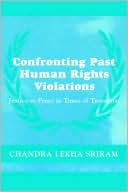

 |

|

The average rating for Confronting Past Human Rights Violations based on 2 reviews is 3 stars.
Review # 1 was written on 2014-08-02 00:00:00 Chuck Gotti Chuck GottiHaunting. |
Review # 2 was written on 2020-04-01 00:00:00 Racheli Ikar Racheli IkarThis book is hard-hitting and heartbreaking. I had never imagined the United Nations to be a perfect, utopian organization but I was quite unprepared for the sheer apathy displayed at all ranks, the very high propensity towards inaction and their actual connivance with the realpolitik of the member states. The overarching question asked and answered in the book is whether the UN could have done something to prevent the genocides in Bosnia, Rwanda and Darfur even as they faced uncertainty about the consequences of their decisions. Drawing upon his own experiences as a journalist covering the Yugoslav wars and the first-hand accounts of UN officials, diplomats and other journos, Adam Lebor concludes that the United Nations had enough information from people on the ground which should have adequately forewarned against the heightened probability of these massacres- the ever increasing impunity and aggressiveness of the Bosnian Serbs; the 'genocide fax' from General Dallaire in Rwanda giving clear, explicit warnings of the extermination plans of the Interahamwe; Mukesh Kapila's repeated briefings and memos about the world's greatest humanitarian crisis in Darfur- and yet, the UN chose to ignore it all and wait it out, ultimately costing millions of lives. The Convention on the Prevention and Punishment of the Crime of Genocide in 1948 sought to precisely define and criminalize genocide under international law, making it an obligation for member states to prevent and punish it. Perhaps, nobody in 1948 could have imagined the extremely perverse way in which this would eventually work out. Because acknowledging mass killings and scorched-earth policies (strategies causing destruction of livelihood and homes with the ultimate aim of the destruction of a group of people) of genocide perpetrators would demand some action, the United Nations spends a disproportionate amount of time denying these and refraining from using the 'G' word, sometimes even blaming the victim groups (e.g. Bosniaks) of perpetrating acts against themselves to generate 'unwarranted' international attention (Is anyone else reminded of Cornelius Fudge and the Ministry of Magic?). Another cover word behind which the UN frequently hides is its 'impartiality' which, in recent times, has become far more important than any of its humanitarian goals. An impartial United Nations is a useful thing only when all parties to a conflict are balanced in their strength and aggression, otherwise, it amounts to an unwillingness to differentiate between the victim and the aggressor and thereby a 'complicity in evil'. In fact, a pattern has emerged in UN responses over time- exaggerate the offenses of rebel victim groups, soften the atrocities of the aggressors, claim that all parties are guilty, sit back and watch. The emphasis on impartiality is carried so far that in Bosnia, UN peacekeepers simply watched as Bosniak men were forced into Serb buses to be carried for execution. Even though caution needs to be exercised with respect to direct military action (particularly with the US losing face over the Iraq war and every perpetrator state ready to cry out 'western imperialism' when questioned on its human rights record), there are other ways to get states to comply- economic sanctions that directly affect the pockets of government officials, threats to freeze assets abroad or impose travel restrictions etc. could be quite effective. Actual implementation of any such measures, however, remains a big challenge due to the fact that perpetrator states are often themselves members of the UN and band together (as in something like a 'human rights abusers club') to block any resolutions condemning their actions or imposing sanctions. It does not help that the promotion of senior UN officials seems to have nothing to do with their good or bad decisions. Some risk insurance is required and desirable for officials making difficult choices in the face of uncertain outcomes, but the current structure provides hardly any incentive for making the right calls. All humanitarian considerations aside, doing nothing to stop genocide carries long term risks. As Madeleine Albright points out, these places are prone to become the hotbeds that create terrorists. Several of the 9/11 hijackers were Bosnian Mujahideen, radicalized by the Muslim massacres in Bosnia. When I started reading the book, I only had a vague idea about the events in Bosnia, Rwanda and Darfur. I found it useful to supplement the information in the book with other independent sources on the web. I was thoroughly impressed by Adam Lebor's 'City of Oranges'. This book is another journalistic masterpiece from the author who is rapidly becoming one of my favorite non-fiction writers. |
CAN'T FIND WHAT YOU'RE LOOKING FOR? CLICK HERE!!!